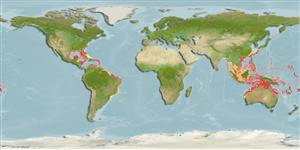Demospongiae |
Poecilosclerida |
Iotrochotidae
Environment: milieu / climate zone / depth range / distribution range
Ecology
Sessile; brackish; depth range 1 - 91 m (Ref. 108813). Tropical
Indo-Pacific and Western Atlantic: Caribbean wide.
Length at first maturity / Size / Weight / Age
Maturity: Lm ? range ? - ? cm Max length : 60.0 cm TL male/unsexed; (Ref. 415)
Sprawling ramose branches, with spiky surface up to 60 cm long; 1 - 5 cm wide. Black with green patches internally and externally. Oscula 0.1 - 0.3 cm in diameter, on side of branches (Ref. 415). Smaller specimens grows as lobes, runners, massive or encrusting. Surface: covered with conules; mostly or entirely smooth for small specimens. Sometimes greenish-yellow. Tough consistency; resilient and barely compressible. Exudate is dark purplish when squeezed. Oscules are scattered or in a row, slightly raised on small lobes and surrounded by a thin collar (Ref. 85482).
Reef; mangrove; seagrass environments (Ref. 415). On hard substrates, often hosting the zoanthid Parazoanthus swiftii (Ref. 85482). Commensal with amphipods (Ref. 82302).
Life cycle and mating behavior
Maturity | Reproduction | Spawning | Eggs | Fecundity | Larvae
Members of the class Demospongiae are hermaphroditic. Life cycle: The zygote develops into parenchymella larva (free-swimming) before settling down on a substrate where it grows into a young sponge.
Collin, R., M.C. Díaz, J. Norenburg, R.M. Rocha, J.A. Sánchez, M. Schulze, A. Schwartz and A. Valdés 2005 Photographic identification guide to some common marine invertebrates of Bocas Del Toro, Panama. Caribbean Journal of Science. 41(3):638-707. (Ref. 415)
IUCN Red List Status
(Ref. 130435: Version 2025-1)
CITES status (Ref. 108899)
Not Evaluated
Not Evaluated
Threat to humans
Harmless
Human uses
| FishSource |
Tools
More information
Trophic EcologyFood items (preys)Diet compositionFood consumptionPredators Population dynamicsGrowth
Max. ages / sizes
Length-weight rel.
Length-length rel.
Length-frequencies
Mass conversion
Abundance
Life cycleReproductionMaturityFecunditySpawningEggsEgg developmentLarvae PhysiologyOxygen consumption
Human RelatedStamps, coins, misc.
Internet sources
Estimates based on models
Preferred temperature
(Ref.
115969): 23.9 - 28.9, mean 27.5 (based on 1216 cells).
Fishing Vulnerability
Moderate vulnerability (44 of 100).
Price category
Unknown.
